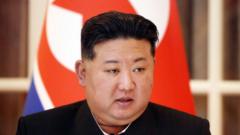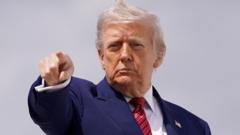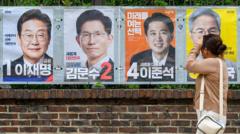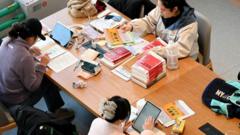South Korea's upcoming presidential election on June 3 follows the controversial removal of President Yoon Suk Yeol. Voters will choose between leading candidates amidst challenges including economic instability, North Korea tensions, and electoral sacrifices made through political strife.
South Korea's Snap Presidential Election: What to Expect on June 3

South Korea's Snap Presidential Election: What to Expect on June 3
As South Korea prepares for a snap presidential election amid political turmoil, key candidates and pressing issues come into focus.
South Korea is gearing up for a pivotal snap presidential election set for June 3, as the nation seeks a leader to succeed Yoon Suk Yeol, who was ousted for enforcing martial law in December. His controversial actions not only rocked the political landscape but also invoked widespread public protests and financial uncertainty. Amidst this backdrop, South Koreans, numbering around 52 million, face the task of electing a new president to navigate both domestic and international challenges.
The unexpected presidential election arises from Yoon's impeachment, following his shocking declaration of martial law, which he justified with a claim of threats from "anti-state forces" and North Korea. This assertion, viewed by many as a self-serving maneuver, ultimately led to his removal, with parliamentary approval and a constitutional court ruling cementing his fate. The subsequent months have seen instability within the government, marked by three acting presidents, including the current leader Lee Ju-ho, formerly the labor minister.
Voter concerns leading into this election are varied. Yoon's martial law has starkly revealed the polarized political climate in South Korea, with citizens divided over his tactics. The potential fallout from the economic disruptions experienced during his presidency has resulted in waning confidence in the country’s economic prospects, especially in light of U.S. tariffs imposed under President Donald Trump. Furthermore, the looming threat from North Korea remains a persistent issue, adding nuance to the incoming president's responsibilities in balancing relations with both Washington and Beijing.
The election’s frontrunners, Lee Jae-myung of the Democratic Party and Kim Moon-soo from the ruling People Power Party (PPP), represent contrasting visions for the country. Lee, who narrowly lost to Yoon in the 2022 election, is seen as a champion for the working class, advocating for job creation and social fairness. In contrast, Kim promotes a pro-business agenda, aiming to restore trust in the economy. Also in the running are other minor party candidates and independents, but notably, this election marks the first in 18 years without a female contender.
Voting will take place across the country on June 3, with polls open from 06:00 to 20:00 local time. Early voting for South Koreans abroad has already been completed. Results are expected shortly after polls close, with the new president set to assume office immediately, without the extensive transition period typical of previous administrations.
Furthermore, Yoon’s legacy remains uncertain as he faces legal challenges, including charges related to insurrection stemming from his martial law attempts, as well as accusations of abuse of power. His recent exit from the party is viewed by analysts as an attempt to bolster the chances of his party’s candidate.
This election, characterized by its unique circumstances and pressing national issues, will shape South Korea's future leadership and policy direction in a time of uncertainty.


















